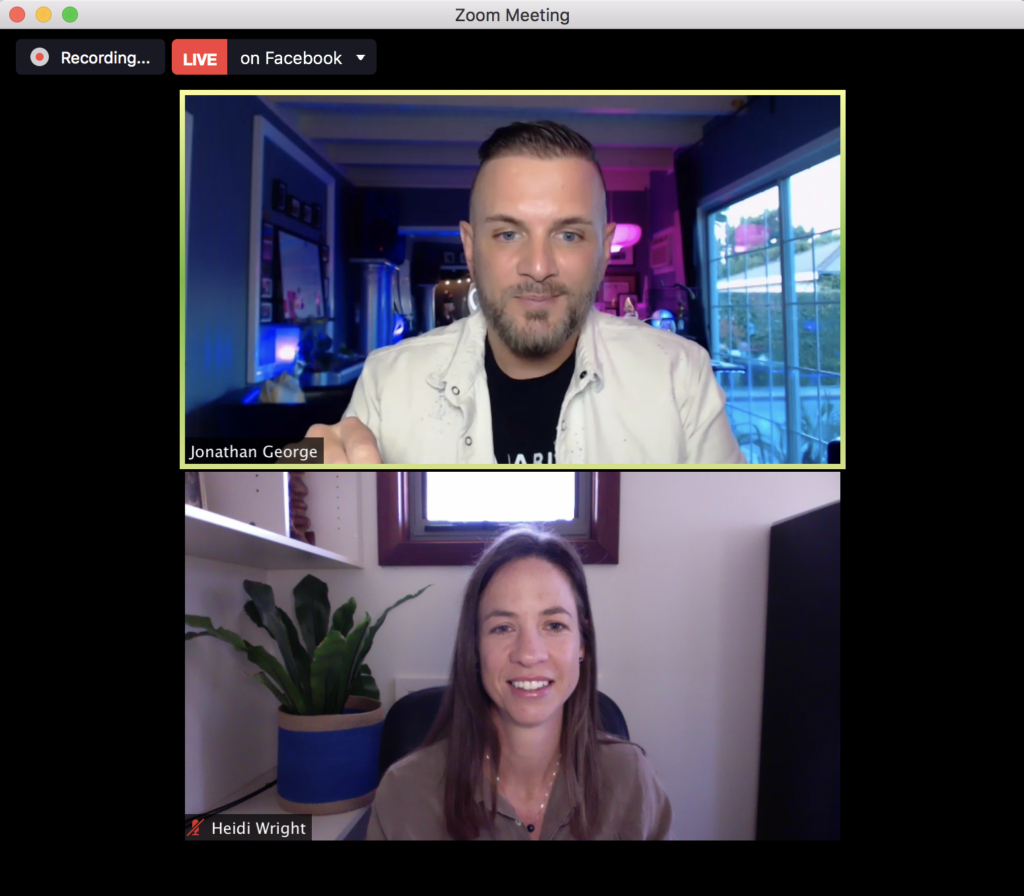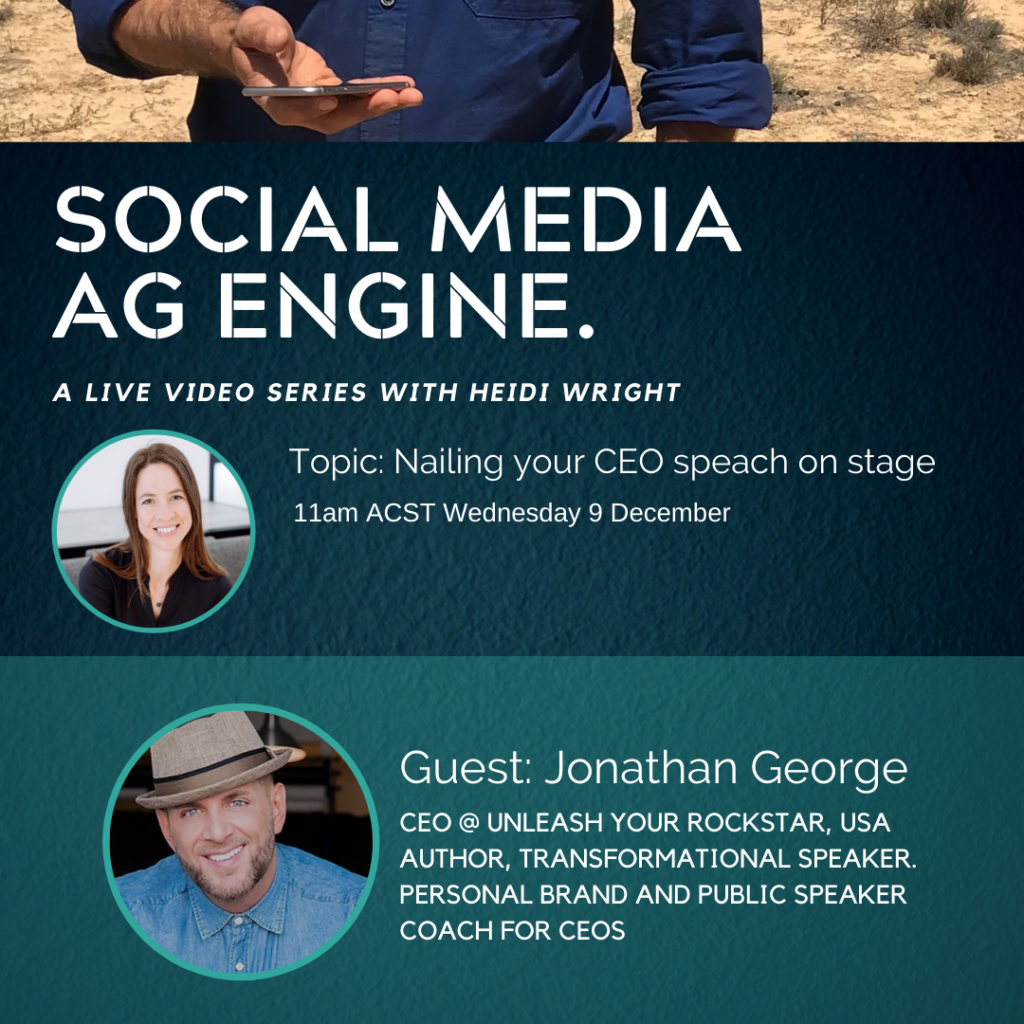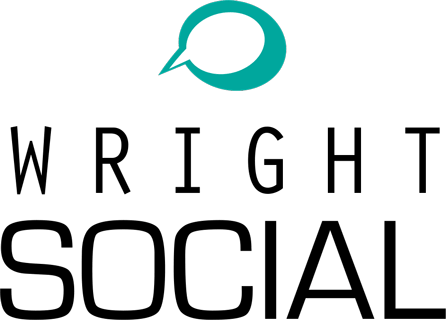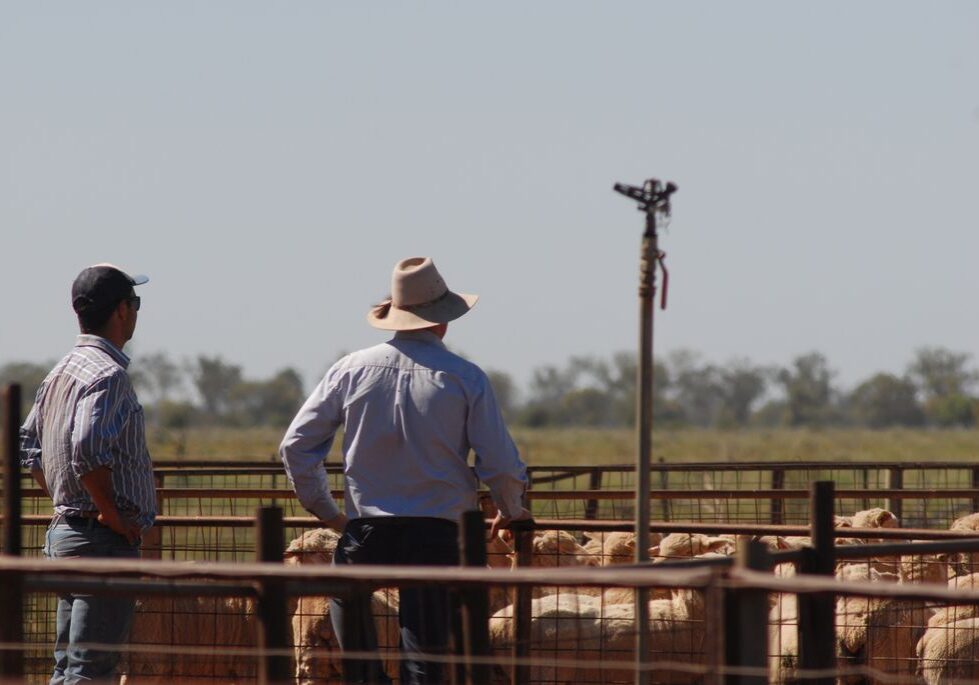Too often, we forget that we are the greatest asset to our business.
Jonathan George has spent the last two decades coaching celebrities and CEOs to unleash their inner rockstars and reach their full potential.
Heidi Wright, Director of Wright Social, speaks to Jonathan George about stepping into your power and telling your story to bring authenticity and engagement to your agricultural business.

Heidi Wright: Let’s do some introductions, Jonathan. So, you’re joining us from LA, and you are the CEO of Unleash your Rockstar. You’ve spent the last 20 years pretty well creating brands from individuals, to celebrities, to CEOs. What people may not know about you is that you also coach people to write best-selling books.
So, it’s not just about performing on stage, but the whole shebang, from content creation to becoming a best-selling author to killing it on stage, and all these other great things. So, in a nutshell, have I covered what you do? Or is there anything else that that you feel we need to build into that picture?
Jonathan George: Well, I mean, that is what it is, is creating rock star personal brands. Everybody thinks it’s a brand colour, it’s a logo, and it’s not those things. Those are nice little assets, those are things that we identify with, but we dive deep into who you are as a person as a brand to really launch you. My clients have over 150 million online followers, and I always say it’s not because they’re the most talented, the most gifted, the most skilled. It’s because we crafted a genuine, authentic brand, and a story that made people really draw into them.
And it’s just an incredible aspect when you decide as a CEO, as an entrepreneur, as a coach, whatever those things that you’re doing, as a business owner, that you are your greatest asset to your business. Number one hands down, you are the number one asset. And you can either use your brand to explode your brand or not. I mean, you look at Tesla, look at you know, Facebook, you look at Apple, we all know who the CEOs are.
Heidi Wright: So true. That’s awesome. Well, let’s talk about your experience with working with CEOs in crafting their speeches and coaching them through to give a really high hitting and impactful delivery.
So, we know stages, or I know stages can be a really powerful way to get in front of your audience, because you’ve got a captured audience. They’ve travelled to be there and then signed up to listen to what you have to say, so it’s a captured audience. How can people prepare before they go on stage so they can make the most of the opportunity?
Jonathan George: Well, first thing that needs to happen, let me just put it down. I spent $30,000 last year and hired a company to do exactly what I do for other people, right? Because I’m too close to my story. I’m too close to my own being.
I was like, “I can’t talk about that. How do I talk about that? I don’t want to play a victim card”, you know, but they’re like, “no, you have to tell these stories”, and if it was anybody else, I would say “you have to tell your story”. So, the first thing that has to happen is crafting your story, crafting a story that will connect to people to understand your ‘why’. Why are you showing up in your space?
And just to give you guys a background of who I am quickly, I was in music forever. I moved to Los Angeles to be a singer, to be a songwriter. I wanted to be an actor, and I landed on a show called Next Big Star, which is Ed McMahon, which was the star search of the day, and I was the grand champion winner, and I had a record deal on the table. I just launched my original, my first single. We were working on my album, and you know, I mean, this was like, the pinnacle of my career. I mean, everything I’d worked for for all these years happening. And I got a phone call and they said, “we’re retracting the contract”. I was like, “what do you mean?” And they said, “we just looked you up and found out that you’re gay”.
And, you know, we say “what?” I mean, nowadays, you’d be like, “what? I mean, come on”. That was 2000, 20 years ago, and it devastated me and crushed me, and it took me back to being a kid, where I was relentlessly bullied for being the creative kid, you know, the kid with jazz fingers, and the one who’s showing up and super creative and doing, you know, singing and acting and playing music.
And then my dad’s a Pentecostal pastor, and I don’t know if y’all have a bunch of Pentecostals in Australia or not, but it’s a very religious organisation, you know, and the spiritual abuse that I went through, you know, it was this reoccurring theme of you’re not good enough. You’re not good enough.
And here I am, 26, sitting here in my living room, just being told that my dreams are being taken away from me. My team went into this whirlwind to try to fix everything. They try to get me married. They try to change my music. They try to change everything about me, how I dressed, and I just said, you know, “I’m not gonna do this, I’m not gonna lie to the world. I’ve never been a liar, and I’m gonna start lying now. If I can’t show up authentically me, then I’m not doing it”. And I quit singing. I gave up my dream. I didn’t have somebody to coach me through it, to know how to show up and be authentically me and still build a brand, so I quit.
And that was when I made a decision that I was going to help people rock the person that they are, rather than trying to change them and make them into something else that they’re not. And this is my “why”. This is why I’m so passionate about people reaching their full dreams, to reaching their full potential, because I didn’t have that opportunity. I quit because I didn’t have that. I didn’t have a cheerleader saying “you can do this. You can go through this”. And while my story doesn’t look just like you, doesn’t sound like everybody else’s, that one thing that we share in common is that we all have felt like we’re not good enough.
Heidi Wright: Let’s talk about that, because I think a lot of us tend to just bury our heads in the sand rather than address it. So, when it comes to imposter syndrome, how do you describe that? And how do you know when it’s showing up?
Jonathan George: Okay, imposter syndrome is basically fear, and that fear is the number one thing that keeps us back from everything, right? “I’m not gonna. I can’t do this”. It’s comparing. Imposter syndrome, it’s huge. Every single one of us, if you start creating something, you start going, “oh, well, so and so has already done that. Oh, somebody is very successful at that, or it’s already been done. I can’t do that”.
I call it the Britney versus Christina syndrome. Everybody wants to be Christina Aguilera. They think that they need to have those vocal skills. They need to have those abilities, but it’s okay to be Britney Spears. And although we may look at her as the inferior singer, she’s one more accolades. She has more number one hits. Her net worth is greater. Her global impact is greater, and here’s the thing you have to remember is that success is 20% talent. Let’s say that again, success is 20% talent, the other 80% is how you brand that talent to shine.
Heidi Wright: So, branding that talent to shine, does this come down to how to nail your CEO speech? Is that about how you brand your story, how you show up, how you prepare for that? How you deliver it?
Jonathan George: Yes. Your greatest asset is you. You have your personal brand. You are the personal brand, and I want you to think of it as the hook of a song. Again, I’m from the music world, I mean, I spent my whole life in music. So, we all understand music. The hook of the song is the chorus. It’s the thing that we keep singing when that song goes off the radio, and it gets hooked in us, right? So, you’ve got to think about your personal brand as the hook of a song. So, it’s the thing that keeps repeating about you.
And the thing is, most people don’t know how to connect to their true story, their authentic self, and to show up in that powerfully in order to make a great impact. And when you craft your story, when you tell your story, if you’re on stage, just like I told you my story before this, you’ll remember that story. You are born to be realised “oh, I am more than enough to be able to do something”. And that’s how you’re going to remember me and my “why” of why I’m so passionate about making sure that you rock the person that you’re supposed to be.
So, you crafting your story is the key essential thing that we have to begin with, for you to understand who you are and how you’re showing up, why you’re showing up.
I just had an artist that I did that I branded her. Zero followers, like literally had nothing. Nothing this year. She had no music on Spotify. Talk about a lot of noise. 40,000 uploads every single day to Spotify. How do you become the blue duck in a sea of yellow ducks?
Heidi Wright: That is the question.
Jonathan George: So, we used her story. We crafted her story. Can I tell you in two months, with her story I was able to book her on 10 podcast, two of those being in the Top 10 podcasts on iTunes. She went from zero followers on Instagram. She booked so many interviews. She was on so many blogs and different things because of her story. She was sexually and mentally abused as a child, locked in closets, and here she is using her music to break through all of that, and the story is just incredible, right?
I mean, is she different than anybody else? We all have stories, but because she’s telling her story and tying it into what she’s doing, she’s breaking through the noise. She has over 50,000 streams on Spotify in one month. One month! She has 12,000 views on her music video. This girl had zero. She has 15,000 followers on Instagram. She had nothing.
So, this is the power of telling your story because honestly, she’s a talented artist, but there are millions of talented people out there. What makes her special? What makes her go on to be standing out? And it’s the story that connects her to the fans and creates the super fans.
Two things out of this are that I told my story on a podcast. And it’s the Growth Now movement podcast, which is in the top 10 on Forbes. So, I connected with Justin Schneck, who is the podcast podcaster, and then I called him, and I said “hey, you got to have this girl on your show”. She talked about it. He’s raving about her now. He just called me, and he asked me to speak at his virtual event, his big major bit as a speaker. I’m going to get an hour slot to speak, and we’re giving her an hour during the break time, the wine and cheese break time, it’s because it’s a virtual summit here, for her to sing and perform for an hour. That would have never happened.
This doesn’t matter. This is not about music. This is for every CEO, every business owner. How do you use your story to captivate an audience, to connect to them, build trust, to build connection, and then make the sale?
Heidi Wright: Yes, so with that, in terms of structuring a speech, would you encourage people to start with their story? And how long should that go for before they get into the purpose for why people are there? Say it’s to take away three key points, and they need to deliver on those three key points, if they don’t craft their whole presentation around their story in delivering those three points, would you suggest that they do a mini story up front so people can get to know who they are, where they come from, and their “why”, and then they can go into the sort of logical speak if you like?
Jonathan George: Yes. I’m somebody who likes to get to the point, get going, you know, but if you’ve got an hour-long speech, and you’ve got to fill that time, you would tell a little bit longer story. You could have some slides. You could have some videos to help, you know, a presentation. Because you think about it, when you turn on a movie, what’s that trailer look like? What’s going to pull us into listen? So, we have to craft the story specifically to get to the point, to pull at the heartstrings so people really understand you. And it doesn’t mean that you have to have a sob story, right? But if you watch American Idol or Australia’s Got Talent, if you watch it, what’s the first thing that they show? They show the story first.
Heidi Wright: They do, actually. You’re right. Where they come from.
Jonathan George: Always the story first, and that’s how they hook you in to love these people. Because it’s just another person being talented. There are millions of talented people on earth, and they just hooked you in and sold you on this person, to follow their journey, to follow their story. So, you don’t need to have this super long one. Now you can tell the story, you can do what we call the braid effect, where you braid it throughout. But you’ve got to hook them in in that first three minutes, three to five minutes, hook them in, and then start transitioning that into whatever it is that you’re talking about.
Heidi Wright: Yes. How do you structure your coaching sessions with CEOs? If there was a CEO listening to this and he was going to deliver a speech next week, and he maybe had the speech down, but he just wanted a bit of coaching, how would you structure that? How would you work one on one with that CEO?
Jonathan George: Well, the first thing is to get clarification. What is the intention? What do you want that end result to look like? Right? That’s the first thing. And then we craft the story. We pull out all the bits and pieces that are going to reflect what that end result wants to be.
Then we have to have a process of one to three steps to talk about why your ag equipment is the most… what it’s going to do for somebody, right? And it’s sharing information, it’s giving information, it’s not selling. You’ve got to give information to people, right? You think about it, it’s like you walk through a perfume counter, they’re giving you free samples away, because it hooks you in, right?
So, if you can share something, if you can give a free something like information away and then talk about it in that information, how important it is to have what you’re selling, right? And then the key is to never sell. You never want to sell. There’s nothing grosser to me than a car salesman, right? I’ll run the other direction. But if you’re really giving me great content, helping me understand how your rotors for the tiller that you’ve got, how that is going to impact my business, how is that going to impact my numbers, my growth, my quickness to whatever I’m doing, right?
Or my cow feeders. You know, whatever this is, like they’re electronic cow feeders. You know, you can get rid of all these other people. Give me the statistics about it and how it works and how it saves people money. You know, those are things that are really incredible.
And then tying that into the end of your story, and then you make an offer. Or sometimes you can’t make an offer, but still, how can people get more of you? And this is where I have assets, you know, do you have a book? Do you have a course that you’re selling? What is it that you’re selling? And how is it all set up so that it’s easy, people can go find you, download it, connect with you, you know, it’s very powerful.
Heidi Wright: Love that, that’s awesome. You describe that very clearly. So, thank you, and Joe in the group who’s live with us said, “yes to being authentically you”.
So, it’s so resonating in the ag industry, because people want to see the whites in your eyeballs, and they want to be able to see that there’s a genuineness behind you, and what you do, and what you offer. Trust is just such a big factor.
Jonathan George: Well, in the ag culture, I’m from Dallas, Texas, so, I was raised on a farm, and even though it’s not like a ranch, we had a big old farm, and it was more enjoyable type stuff, but what I know to be true is that in the ag world, it’s all about connection, and trust with people, it’s community. And how do you build that community with people? How do you create that fan base of friends and people, and be authentic and real, and be down to earth and really just create that trust with somebody? You can’t do it without a great story.
Heidi Wright: Without a great story. Awesome. Many of us in the ag industry are entrepreneurial in spirit, particularly the next generation coming into ag, they’re having to think differently. It’s not like it’s all set out and they follow a programme necessarily. To survive, they have to think ahead and be innovative. A stat that really sort of shot my eyes up was when I read that 70% of entrepreneurs suffer from imposter syndrome, lacking self-confidence, you know, comparing yourself to others, thinking “I’m not good enough”, feeling like a pretender, or “oh, am I really getting paid to do this?”

Heidi Wright: What are some tactics to recognising when that comes up, and then overcome that?
Jonathan George: Well, I’ll tell you real quick, I was hitting glass ceilings in my business and was like, “I’m more talented than anybody that I know. Nobody can create the stuff that I’m creating, what is my problem? I’m seeing people who are less talented than me making greater sales and doing more”.
And so, I went on this search three years ago, to figure out what is going on inside of me. I seemed confident. I don’t feel like I had any fears. I went got my Master’s practitioners licence in neuro linguistic programming, NLP, which is retraining the brain how to think and how you talk to yourself. And so, I wanted to be able to use this in my business and be able to help people overcome this junk that we all share, right? And so, I realised that I had that fear of “I’m not good enough”.
And everybody in the space that was with me at the time, because I did it in front of this big group of people, how embarrassing is that? But I was like, “okay, I’m gonna be real, just vulnerable right now. Let me just share all this and cry and have snot running out of my nose”. But what I found is that we’re always going to have fears. Even though I realised what those fears that I’m not good enough came from, where it came from, childhood and to my young adult life all the way until I was 26 years old when I got my record deal taken from me, I found out what that was, and I was like, “oh”.
But the reality is we all have that “I’m not good enough”. And it’s always going to pop up, no matter all the self-work that you do, all of the self-development, the process, we’re always going to have that same exact fear pop up because we all fear what people think about us. We all fear the judgement, whether it’s self-judgement or judgement from others. So, it is a constant reminder.
Even myself, as successful as I’ve been, I have to talk myself through “you got this, just do it. Just show up. You’re trying to be perfect. You’re trying to be everything to everyone. You just go be you, Jonathan. You just keep showing up. Keep showing up powerfully every single day, taking one foot in front of the other, one small step at a time”. And then all of a sudden you see these incredible results happen. So, it is literally a conversation that we must have with ourselves at all times. “You got this.”
And it goes back to those cheesy statements of the person sitting in front of the mirror like, “you are amazing. You can do it.” Right? But it’s the truth of those self-conversations that we have with ourselves. If Britney Spears and do it, why can I?
Heidi Wright: Yeah, that’s it. It’s conversations going around our minds. It’s that mindset. How you feel is a direct result really, of what’s going around in your head. So, to control your feelings, you’ve got to work on this thing first.
Jonathan George: And Heidi, here’s the other thing. What I wish I would have known three, four years ago! I was burned out, I was exhausted. I mean, I built my company. I wish that I would have had a coach all of these years. I could have retired already had I had the right coach. You understand what I mean?
And so now I have coaches. I’ve spent $100,000 in the past three years on coaches to help me and my business, and not everybody can do that, but whether that’s 500 a month, and you have a coach that’s going to help you through, that is the biggest key to keep you in check.
If you want to make it to the Olympics, if you want to make it to be a star football player, or star athlete, if you want to be a movie star, if you want to be a singer, if you want to be the best actor, those people have coaches. Why in the entrepreneurial world, do we not think that we need coaches? There are people who have already experienced where you’re going. Knock out your time, quit trying to figure everything out and just hire the coach to be like, “bam, bam, get you there quicker”. It’s the key thing.
Heidi Wright: Awesome. Well, that’s so good to hear that from you, particularly since you’ve gone through the experience yourself, and you’ve seen how a coach can help you move from A to B.
I think some of us can feel quite vulnerable, meaning that maybe a coach can help us move ahead. You know, we think we’ve got to have all the answers or to prove our worth, or to do the hard yards and hard work to earn our right to be in the position of a business owner or profitable business. But the smart people these days, they’re actually looking at someone who’s done what they’ve done, they’re knocking on their door, and they’re saying, “hey, can I have a chat?”
Jonathan George: You think about the people who hire you. Those people are freeing up so much of their time because they’ve hired a social media person to take care of the stuff that they hate, so they can focus on the real business, and create what they need to create and to do all the paperwork and whatever. They allow you to do the other work that takes so much time and energy, right?
The really incredible thing is that it takes millions of years, or like thousands of millions of years, to create a diamond. I can’t remember what it is, but it’s a very long time. But under the right circumstances, the right heat, the right pressure, a diamond can be created in the lab that is more clear, more beautiful, in just a few days. So, do you want to take forever to get to where you want to go? Or do you want to have the right coach and the right team behind you to make you grow quickly like that and be “bam”, right?
It just shouldn’t take that long. We didn’t have coaches really when I started. You didn’t hear anybody having entrepreneurial coaches, business coaches. That didn’t exist. People got smarter along the way, and now I’m like, “where was this?” You know, this would have helped me so much in my life.
Heidi Wright: The biggest challenge though, there are so many coaches marketing themselves, particularly on social media, that it’s difficult for business owners to determine, number one, are they legit? And number two, are they the right fit? That I think is the hurdle to being able to actually make that next move for that right coach.
Jonathan George: It’s the same thing if you hire a therapist, if you’re dating, if you are looking for a house, you’ve got to search, right? It’s like the business is going to manufacture what you’re creating. You have to do your homework. You have to research and feel the energy with somebody because sometimes, even though the coach might not be the smartest person, that person is going to be able to lift you up, build your confidence in order to get you to the next level, and you will know when it’s the right time to move on to another coach.
Heidi Wright: Jonathan, if people want to learn more about you, where can they go?
Jonathan George
You can go online to jonathangeorge.com or unleashyourrockstar.com and I have some freebies. On my freebie section of my website, you can go on “Break through the Imposter Syndrome”. It’s a free download, you can do that.
My book is coming out next early in January February called “Unleash your Rockstar”.
Heidi Wright: That’s awesome. So please, guys, go and check it out. I’ll certainly check it out, and I’m interested in learning more about what you do. So, Jonathan, thank you so much and we’ll see you around.
Jonathan George: And I would love to just say this to your people, before we leave, I know we want to cut it off. Remember, if you’re not stepping into your power, you’re not stepping into your greatness of what it is that you’ve got going on in your life, the entrepreneurial spirit, whatever that product is. If you’re not stepping into your power, you’re not only doing yourself a disservice, but you’re also robbing me of my blessings, the people around you that need your product, the people that are around you that need what you have to make their life better, to make it work better, and to be much more effective. So, make sure that you’re getting out there.
Remember 20% is pure talent. The other 80% is how you brand that talent to shine. It’s all about how you get out there into the world and share your story.
Heidi Wright: Excellent. Thank you.
Jonathan George: Thank you so much for having me on.
Heidi Wright: Of course. It’s been my pleasure.
Got questions? Join our FREE Facebook Group for ag-related businesses & professionals to learn and share social media marketing tactics here!




